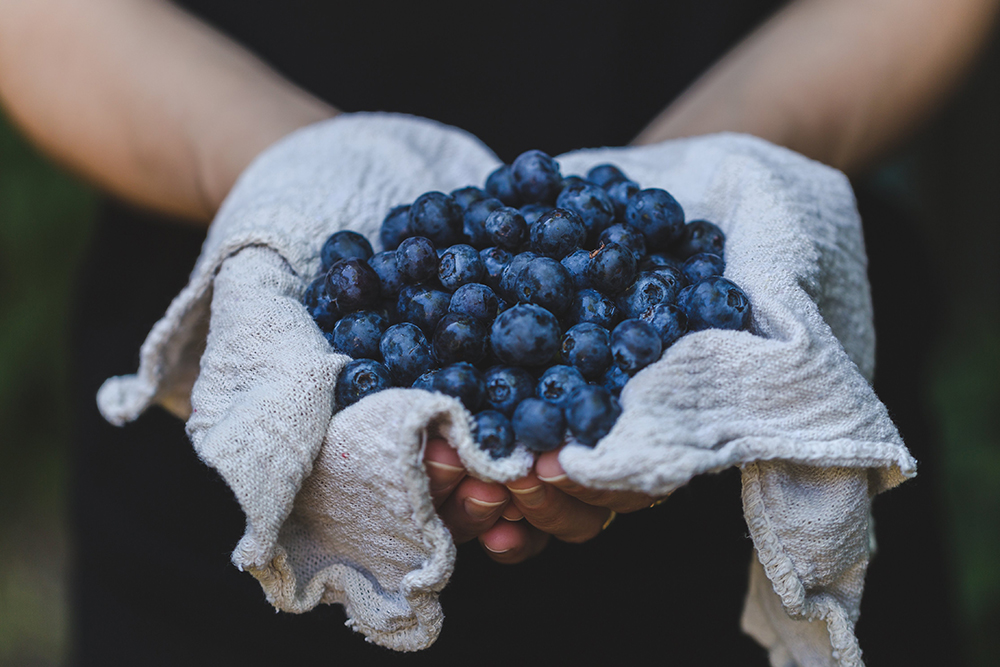Lower Blood Pressure with Blueberries

There is trial data indicating blueberries help reduce both systolic and diastolic blood pressure.
This double-blind, placebo controlled trial assigned 48 women to receive either 22 grams of freeze-dried blueberry powder or 22 grams of a control powder daily for 8-weeks. Results indicate that blueberry consumption may reduce blood pressure and arterial stiffness.
These improvements may be linked to enhanced nitric oxide mediated vasodilation. Vasodilation refers to the widening of blood vessels, which in turn lowers blood pressure because the heart then exerts less force against arterial walls as it circulates blood.
At the conclusion of the study, participants consuming the blueberry powder daily on average reduced systolic blood pressure 5.1% and diastolic blood pressure was lowered on average 6.3%.
Twenty-two grams of freeze-dried blueberry powder is equal to about 1 cup of fresh blueberries daily.
Nutritional Content of Blueberries
Blueberries are a great source for many nutrients, such as Vitamin C, dietary fiber, and manganese, and provide only 80 calories per cup.
Vitamin C
This water-soluble vitamin is essential for normal growth and development, as well as collagen production. Collagen can be found in bones, muscles, skin, and tendons. Vitamin C is also an antioxidant, which protect cells from free radical damage. According to the National Institutes of Health Office of Dietary Supplements, a diet rich in antioxidants may help prevent or delay the development of heart disease and some cancers. Men should consume 90 mg of vitamin C daily and women should consume 75 mg daily. A 1 cup serving of blueberries provides 14 mg of vitamin C.
Dietary fiber
Dietary fiber is found mainly in fruits, vegetables, whole grains, and legumes. It’s known as the roughage or bulk and includes the parts of plant found the body cannot digest or absorb. There are two types of dietary fiber – soluble and insoluble. Soluble fiber dissolves in water, while insoluble does not. Recommended fiber consumption varies with age. For those under the age of 50, a man should consume 30 grams and a woman 25 grams of dietary fiber daily. Of this, 15 grams or more should be soluble fiber. A 1 cup serving of blueberries contains 3.6 grams of dietary fiber…mostly insoluble.
Manganese
Manganese is a trace mineral found in foods such as nuts, legumes, seeds, tea, whole grains, and leafy greens. Manganese deficiency is related to osteoporosis and anemia. Men should consume 2.3 mg and women 1.6 mg daily. A 1 cup serving of blueberries provides 0.4 mg.
Buy and Use Blueberries
Blueberries are in season from April through September. During the off season, blueberries are imported from South America. When buying fresh blueberries, select berries that are firm, dry, plump, and smooth-skinned. They should have a silvery surface with a deep purple-blue to blue-black color. A berry is not ripe if it is reddish in color and berries do not ripen after they are picked.
Store fresh blueberries in the refrigerator and eat them within 10 days or purchase.
Based off this trial, you don’t have to consume fresh blueberries to see blood pressure improvements. You could opt for dried, frozen, and canned blueberries as well.
A bag of frozen blueberries should feel like the berries are loose and not clumped together. If you do not use a whole bag of frozen berries in one setting, quickly return the unused portion to the freezer. Once you thaw frozen blueberries, consume them within 3 days.
Ways to Eat Blueberries
Grab and go. A handful of fresh, washed blueberries and quick and easy snack. You can add fresh or frozen blueberries to cereals, salads, and sauces. Blueberries also add flavor to smoothies and yogurt. You can also opt to add blueberries to muffins and pancakes.
If you are working to lower blood pressure, sign up for the free ecourse 7 Natural Ways to Lower Blood Pressure at http://lowerbloodpressurewithlisa.com.
All the best,
Lisa Nelson RD



